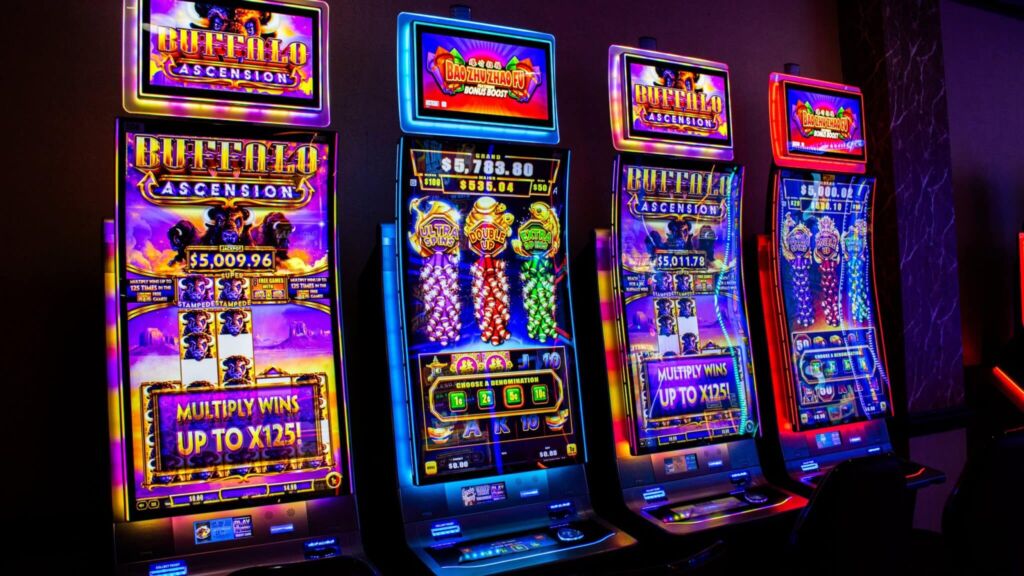Becoming skilled at high-stakes slot machines is widely regarded as a peak experience in casino gaming for those chasing major rewards, yet it involves more than mere chance. To successfully navigate high-stakes slots, one needs strategy, thorough game knowledge, and a dedication to gambling responsibly. This article offers an in-depth look into mastering high-stakes slots, providing novice and experienced players alike with tools to enhance their gambling experience. It covers game mechanics, dispels common myths, offers tips on managing finances effectively, and underlines the vital importance of playing responsibly.
Grasping the fundamentals of High-Stakes Slot Machines
Set apart by their elevated betting levels and potential for greater earnings, high-stakes slot machines appeal to players ready to wager large sums per spin. These can range from just a few dollars to thousands. The excitement and the potential to win sizable, life-altering jackpots make these games highly attractive, yet they come with substantial risk. The high volatility means chances for major wins exist, but losses can quickly add up too.
For those wishing to play high-stakes slots effectively, it's crucial to understand the operation of these games. Similar to other slot machines, high-stakes variants use a Random Number Generator (RNG). This ensures each spin is independent and random, unaffected by previous outcomes. The RNG generates numerous numbers every second, and upon hitting the spin button, a number is selected that decides the reel outcomes. This guarantees fairness and unpredictability, stressing that no definitive strategies can accurately predict slot results.
A crucial term in slot gaming is the Return to Player (RTP) percentage. RTP, represented as a percentage, theoretically indicates how much a slot machine pays back over numerous spins. For example, a 96% RTP means an average return of $96 for every $100 wagered. While it suggests generosity, RTP represents a broad average; short-term returns vary due to variance. High-stakes slots typically share similar RTPs with regular slots, so it's smart to check the precise RTP of a game before starting—this info is often available in the help section of the game or via online guides.
Volatility, or variance, is a crucial factor in slot games, particularly relevant to high-stakes gaming. It refers to the risk level in a game regarding payout frequency and size. High volatility slots, well-known in high-stakes circles, are famous for larger but infrequent payouts, whereas low volatility slots offer smaller but more regular wins. For high-stakes players, understanding volatility is key to managing their budget. High volatility games can lead to periods of no wins, demanding a larger bankroll to withstand these challenges for the chance of bigger rewards.
Myths and Misunderstandings about Slot Machines
The realm of slot machines is full of myths, with high-stakes slots being no exception. One common misconception is the belief in 'hot' or 'cold' machines. This suggests that a slot machine that recently paid out a lot won't pay again soon (cold) or one that hasn't paid in a while is due for a win (hot). However, due to the RNG, each spin remains independent, making this notion invalid. Slot machines have no memory of previous plays, keeping the odds unchanged for each spin.
Another erroneous belief is that certain times or days are more favorable for playing slots. Casinos run non-stop, with the RNG functioning consistently all the time. Payout rates are not tweaked based on time or visitor count. Similarly, the idea that casinos remotely adjust slots' payout rates isn't accurate in heavily regulated markets where transparency and fairness are priorities. The slot machines’ RNGs and RTPs undergo strict testing and certification by independent groups. While casinos can choose which slots to offer and set the RTP within a legal range, they cannot adjust payout percentages in real time.
Misunderstandings regarding strategies in high-stakes slot play are common. Unlike games like poker or blackjack, slots mainly rely on luck. Claims of surefire strategies applicable to slots are typically misleading. However, there are strategic methods within the scope of slot play—these involve informed decisions to mitigate risk and extend playtime, not influencing the RNG. They include selecting games with good RTP, comprehending volatility, and focusing on efficient bankroll management. The true strategy in high-stakes slots lies in playing smart rather than trying to outfox the machine.
Practical Bankroll Management for High-Stakes Slot Play
In high-stakes slot gaming, effective bankroll management is indispensable for sustainable gambling. Due to the high stakes and volatility, a strong bankroll management plan is essential to minimize risks and prolong play. A basic rule is setting aside a specific budget for gambling and adhering to it strictly. This should be an amount you can afford to lose without impacting your financial stability or personal commitments. Viewing gambling as entertainment with a predetermined cost is a wise attitude.
Splitting your bankroll into sessions can be a sensible approach. Outline how many sessions you'll have and allot a portion of your total bankroll to each. This strategy helps avoid impulsive overspending in one go and promotes better gambling control. For high-stakes gaming, creating more sessions with smaller allocations rather than a few sessions with large sums is often beneficial. This can help navigate the volatility of high-risk slots. If your monthly gambling budget is, for example, $3,000 , consider dividing it into 10 weekly sessions of $300 each rather than 3 sessions of $1,000 .
Setting winning and losing thresholds is a crucial aspect of managing your bankroll. Prior to a gambling session, set both a target for winning and a limit for losing; once either is reached, end the session. Setting win limits ensures you keep profits and resist the urge to gamble your winnings away, while loss limits stop your funds from being drained during unlucky streaks. For high-stakes play, these limits should be thought through based on your bankroll and the game's volatility. A typical method is to set win limits to 50-100% of your session bankroll and a loss limit to 50% . For instance, with a $300 session budget, you may aim to quit after winning $150-$300 , or after losing $150 .
Understanding how to appropriately set bets in high-stakes slots is important too. Although the temptation to go for maximum bets to maximize potential returns is enticing, it's often wiser to adjust bet sizes according to your bankroll and session aims. Smaller bets can extend play duration and better manage low win periods, while larger bets might quickly deplete a bankroll, especially with high-volatility games. Experimenting with various bet sizes can form a part of a strategic routine, but always within your pre-established financial frameworks. Begin with smaller bets to gauge a game's volatility, and increase stakes cautiously.
The Psychological Dimensions of High-Stakes Gambling
The thrill of betting big, especially in slot games, is deeply linked to our psyche. The chance of hitting a jackpot, the surge of adrenaline from taking risks, and the engaging nature of slot machines all merge to create an intense psychological experience. To control these impulses and gamble wisely, it's crucial to comprehend these elements. A classic cognitive error, the 'gambler’s fallacy,' involves the incorrect belief that past events influence future outcomes, especially relevant in slots. Gamblers may think a win is imminent after consecutive losses or a slot is due to payout. Recognizing this misconception and understanding the true randomness of slot games is essential for making wise decisions.
Regulating emotions is a crucial aspect of gambling, particularly when high stakes are involved. The surge of joy from victories and the disappointment from losses can trigger strong emotions, which can lead to spontaneous and often regrettable decisions if not managed. For instance, attempting to win back losses by wagering more is a frequent trap that results in greater losses. On the flip side, the confidence that comes from winning can lead to careless gambling. It's key to keep a balanced emotional state, remaining rational and composed regardless of immediate results. Practices like taking breaks, staying mindful, and being aware of one’s emotional responses can be beneficial in managing these mental strains.
Casinos are crafted environments with stimulating lights, enticing sounds, and a buzzing social vibe, all designed to enhance the gambling experience. For those indulging in high-stakes gambling, who might spend considerable time here, awareness of how these influences can sway behavior is important. The sensory overload can boost excitement and impulsivity, possibly leading to a departure from your predetermined strategies and limitations. Staying aware of these environmental cues and actively sticking to your financial and time plans is imperative. Setting specific durations for your casino stays and making time for breaks away from the games can help maintain perspective.
Knowing why you engage in high-stakes slots is an essential aspect of the mental game. Are you in it for entertainment, the excitement of risk, or are you trying to address financial issues? Gambling should be seen as entertainment, not a source of income or a solution to financial troubles. If it’s becoming a form of escape from stress or negative emotions, it might signal an unhealthy gambling relationship. Introspection and a candid evaluation of your reasons are vital. Should you find yourself gambling for purposes beyond fun, it's wise to seek guidance and resources for responsible gambling.
Engaging in high-stakes slot play demands a solid dedication to gambling responsibly. This commitment is not merely about avoiding compulsive gambling but ensuring that the activity remains enjoyable and within safe boundaries. Establishing and maintaining personal restrictions is fundamental to responsible gambling, covering not only financial limits but also the duration of play. Time boundaries are crucial as they help avert prolonged gambling sessions and balance one's lifestyle.
For high-stakes gamblers, recognizing signs of problematic gambling is critical. Compulsive gambling leads to adverse consequences in life's various domains. Warning signs include an obsessive focus on gambling, betting increasingly larger sums for excitement, repeated unsuccessful attempts to control gambling habits, irritability when trying to cut back, gambling to escape problems, and jeopardizing important relationships or job opportunities. Identifying such warnings in yourself or others necessitates seeking help.
There are numerous support options for those experiencing gambling difficulties, such as non-profits like the National Council on Problem Gambling (NCPG) and Gamblers Anonymous (GA) , offering resources and treatment. Platforms such as responsiblegambling.org provide tools and insights for maintaining responsible gambling. Many casinos also have responsible gambling initiatives and self-exclusion measures to help individuals control their gambling activities. Taking advantage of these programs and seeking assistance exemplifies responsibility and enables you to keep enjoying gambling in a regulated manner.
If gambling starts to cause trouble, seeking assistance is an essential step. Start by speaking to trusted individuals—be it a friend, family member, or therapist. Various helplines and online platforms provide discreet support and advice. Remember, gambling problems are a recognized behavioral addiction requiring professional aid, and addressing it early can prevent more severe outcomes while regaining balance. Incorporating responsible gambling habits and knowing when and where to seek help is imperative for high-stakes slot players to continue enjoying the game while safeguarding their personal well-being.
To excel in high-stakes slot gaming, one must adopt a strategic approach focused on informed choices, disciplined money management, and unwavering responsible gambling. Although the lure of hefty jackpots is strong, understanding the inherent risks, game mechanics, and psychological factors is vital. By dispelling myths, applying effective financial strategies, and being mindful of gambling psychology, players can navigate the high-stakes terrain with skill and responsibility. Ultimately, success in high-stakes slots lies not in beating the house edge but in enjoying the game with control and awareness, safeguarding one's financial and personal well-being by playing smart and responsibly.
The National Council on Problem Gambling (NCPG) offers a variety of support for individuals dealing with gambling issues.
♤ This article was first published on September 30, 2024, and was refreshed on February 22, 2025, to ensure it reflects the most up-to-date and accurate information.
External Resources:



